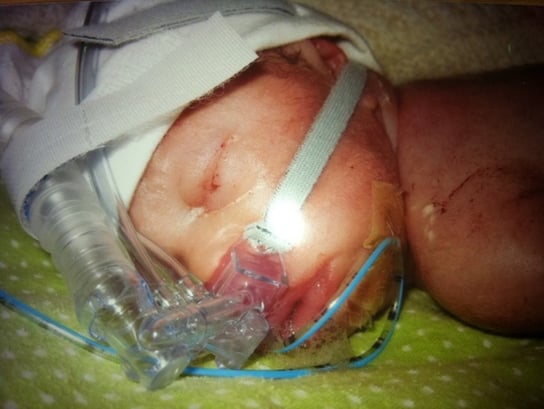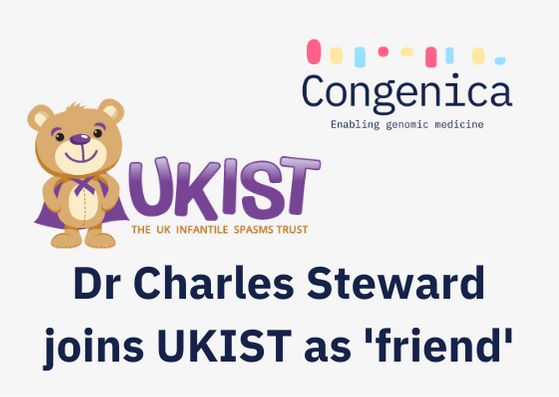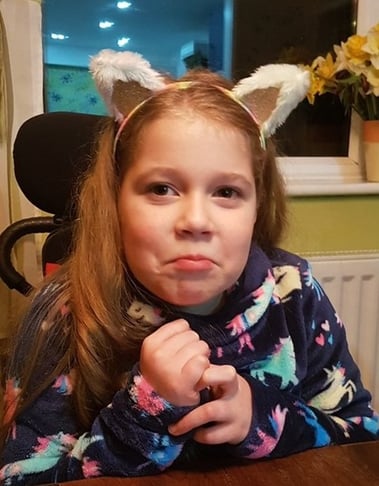Dr Charles Steward, Patient Advocacy and Engagement Lead for Congenica, joins the “friends” of the UK Infantile Spasms Trust as an advocate and advisor.
Dr Charles Steward - my story

My daughter was born in 2012 at 30 weeks, and spent her first month in intensive care. When the time finally came to leave the hospital, we were relieved and felt incredibly lucky to be taking home a healthy baby, despite her premature entry into the world. But when she was around six months old, we noticed she had stopped laughing and taking an interest in her surroundings. We knew something was very wrong when she started making strange movements, so we took her to A&E, where we were told that she had West Syndrome.
She was entered into the International Collaborative Infantile Spasms Study (ICISS), which used both prednisolone and vigabatrin that successfully stopped her seizures after 24 hours which allowed her to start developing again, albeit at a slower rate to other children. This was essential as the seizures are believed to cause irreversible brain malfunctioning. Therefore, stopping them is key to giving the child a better chance of developing. Imogen has also been entered into the 100,000 Genomes Project, to help look for answers to her challenges because scientists and clinicians know that many neurological disorders are the result of genomic mutations. So far, nothing has been found to describe her challenges, but we continue to search.
Providing a patient perspective
When you are first given a very serious diagnosis that is likely to have life-long symptoms, it is important to try and find support with families who are experiencing similar challenges. You can take great strength from each other and help raise awareness and drive research in the disease area – the parent/patient voice is very powerful!
This is what the UK Infantile Spasms Trust does so brilliantly, and I am delighted to join UKIST as a friend. I hope that I can support this incredibly important charity in any way that I am able to, whether that’s by raising awareness of the charity, raising awareness of infantile spasms or by advising on areas of research that UKIST can support.
My role at Congenica as the Patient Advocacy and Engagement lead is about making sure that people have information available to help them understand the benefits and limitations of genomic medicine, the importance of getting a quick diagnosis as well as raising awareness of rare and genetic disorders, such as infantile spams.
Friends of UKIST
Jenny Rawling from UKIST said: “The UK Infantile Spasms Trust (UKIST) was established in 2017 and provides vital support to families with children affected by the rare seizure disorder infantile spasms (IS), also known as West syndrome. The charity offers a lifeline to anxious parents via its online community and works alongside medical professionals to raise awareness of this little-known condition. Our aims are to educate and raise awareness, because early diagnosis is critical to good outcomes, to support affected families with online communities and a grant scheme, and to facilitate research to advance understanding of this rare form of epilepsy. We are delighted to be supported by several ‘friends' who generously give their time to further our work, and Charles brings a unique perspective as both a researcher in the field of genomics and a parent of an affected child.”
Congenica Patient Advocacy and Engagement at Congenica
At Congenica, we want to help patients navigate often confusing and disparate information by providing educational materials that are trustworthy and helpful. Our aim is to ensure patients, clinicians and researchers understand the patient journey from referral, through diagnosis and beyond.



.png?width=320&height=192&name=Untitled%20design%20(8).png)
.png?width=320&height=192&name=Since%202016%2c%20the%20number%20of%20women%20working%20in%20STEM%20fields%20in%20the%20UK%20has%20increased%20by%20216%2c552%2c%20taking%20the%20total%20number%20over%20the%201%20million%20mark%20for%20the%20first%20time.%20Women%20now%20make%20up%2024%25%20of%20the%20STEM%20workforce%20i%20(2).png)
-1.png?width=320&height=192&name=Deciphering%20Developmental%20Disorders%20(1)-1.png)